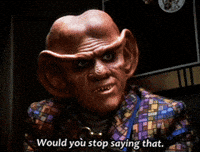- cross-posted to:
- politicalmemes
- cross-posted to:
- politicalmemes
NO WAR BUT CLASS WAR
What about the dominion war?
The Dominion war was about the Founders trying to eliminate any threat to their status as the ruling class.
Oh please, it was to stop Federation expansionism.
And Robot Wars?
And Storage Wars!?
But we nearly lost Worf!
I know, but we’ll get him next time!

I know this is a meme community and probably not the right place to ask. But the meme prompted my question and I promise this is a good faith question.
If labor is entitled to all it creates (i agree! In principle), who determines what that is? For example - someone operating an injection molding machine might “create” a million doodads in a year. But the machine and the material and the electricity and the QA of those doodads are all created/done by someone else. How is that divvied up?
Personally I am leaning toward UBI funded by a capital tax, along with a functional labor market, as kind of a solution here. But I’d appreciate any easy-to-digest references.
Labor is entitled to all it creates, but that doesn’t necessarily mean each laborer should receive the full value of what that individual laborer creates. It means that the laboring class should receive the full value of what the laboring class creates. Following that logic all the way through, it necessitates that labor be the only class, and thus a classless system. There are… A few different ideas on what that system should look like, with various and myriad different levels of complexity (and authoritarianism), but the basic idea is that ownership of the tools by which we ensure our survival (ie, the means of production, the productive materials) should not be held by an elite few who profit wildly off the labor of the vast majority of us. They should instead be held in common (again, different models ranging from a worker co-op to a fully planned economy with the state standing in as a sort of proxy for the worker), and thus the value created by the laborers who are working those productive machines is more equitably distributed.
Basically, if Tim Apple wasn’t around and Apple could be run as a worker co-op, each employee could be making a ridiculous amount of money. Or, more realistically, each employee could make a living wage, and the excess could be funnelled back into the business for innovation, expansion, whatever. If you extend that out and apply the model to an entire national economy, you could use those excess funds for healthcare, infrastructure, UBI, food assistance, bombing brown kids. All the stuff that nation states like to do.
The problem with the laborer making all that they make, is that it isn’t always equal. Self regulation is a more difficult mark than most realize. Customers have different demands and laborers all think they have the highest skill set. But that simply isn’t factual. There are many gades in between and managing it takes a third party when the employee threshold is over 5.
That leaves out all the hours they get paid. Their benefits. The customer contracts. And so many other factors. Mid management is a necessity in many businesses. They are paid for mitigating all the paperwork involved as well as all the problems that the laborers don’t ever see.
And depending on the situation, those are also laborers. Management has a role to play in any decently sized firm, regardless of it’s structure or ideology. The argument here has little to nothing to do with management, it has to do with ownership. Should the employees collectively own their workplace, or should a single entity or group of shareholders own the workplace?
Hell, even the IWW let me sign up as a manager, though they technically have a “no bosses” rule.
I think self ownership would be awesome. However not everyone saves or invests. And so we are here. Someone had a great idea and traded it for equity and many have done it since.
Not everyone would need to save or invest. Each individual employee would not be collecting the full value of what they produce. They would all be collectively collecting the full value of what they produce via the business. Management still exists, money still goes back into business. This isn’t some fantasy scenario, it actually exists successfully in the real world. Mondragon is the most cited example. Just because the enterprise is collectively owned by the workers doesn’t mean that each worker is in full control. It means the firm is run democratically, collectively.
The thing last trips me up is the idea that there’s no value added by the employer so it’s all theft. Sure, the value added is definitely less than what the employer keeps, but there is some value added even if it’s only in the sense of an agent getting “buyers” for your labour.
The thinking, I believe, is not that managerial work isn’t work, but that ownership is not a reason to take a cut of the profits. Think of it more like - in a big corporation, lower and middle management does something useful (theoretically), as does the sales department, and even some of the corporate brass at the top. They still do some form of useful labor, even if primarily social and mental labor rather than physical.
But what do the shareholders do, other than make decisions whose only purpose is to maximize their own payout regardless of its effects on the health of the firm?
The managerial class may be over-compensated in our current system, but they still deserve compensation. But the investor class is parasitic, in this thinking.
I was playing a little life sim game (Kynseed. It’s not bad)
I bought the town general store, and money just started rolling in. I didn’t really have to do anything. The staff I hired dealt with customers and stocked the shelves, but I was keeping all the profits. I actually felt kind of guilty about how brazenly but also thoughtlessly capitalist it is.
I felt less bad when I started bringing in rarer stuff to sell (because people need to buy monster parts and fish, I guess), but the default is just “I own this so I get money without work”
Anyway. It’s just a video game but it made me think
The main thrust, I think, is “Fellow gets 90% of the profit just for owning the capital” is cut out of the equation more than the exact calculus of which laborers get what percentage. The answer to that question probably varies wildly depending on what kind of socialism or post-capitalist system one prefers.
Hypothetically each trade provides for the other. You raise cattle, so you give the baker some butter, and milk, and the butcher some meat, and they give you back some bread and steaks. The carpenter builds your and their homes and you each give him some of your goods. It’s a great theory, and works well in small communes. Idk how it works in a global society, and considering all of the failures we’ve seen with it, I’m not sure if anyone else knows either. I’m aware this is like an elementary level explanation, and ignores a lot of concepts and examples, but I’m typing on a phone, and I’m sure someone else will expand upon it.
It doesn’t work in anything beyond a small agrarian community with simple needs. It’s as much a fantasy as the idealized small American town of the 1950s. There are no closed-loop economies.
Which farmer is going to provide me with eggs every week in exchange for my work as a web server admin? Will the farmer be obligated to provide the carpenter with food for the rest of his life after building a house? A one-time trade isn’t going to keep the carpenter from starving to death. What exactly would an astronaut, or a philosopher, or a quality assurance engineer or a geologist offer in trade for basic sustenance or medical services?
Complex work requires a complex economy. A complex economy requires an abstraction for value (e.g. not barter) to allow for compensation for abstract and long-term tasks.
Removed by mod
That’s why I poop on company time

Who is the author of this poster?
I want a high-quality print of this.
I’ve seen a sticker of this IRL, I miss whoever kept putting up pro union star trek stickers on the lamp posts, I haven’t seen any new ones in about a year.
more than a hero, a union man
Why is Miles being played by one of the characters from La Planète Sauvage?











